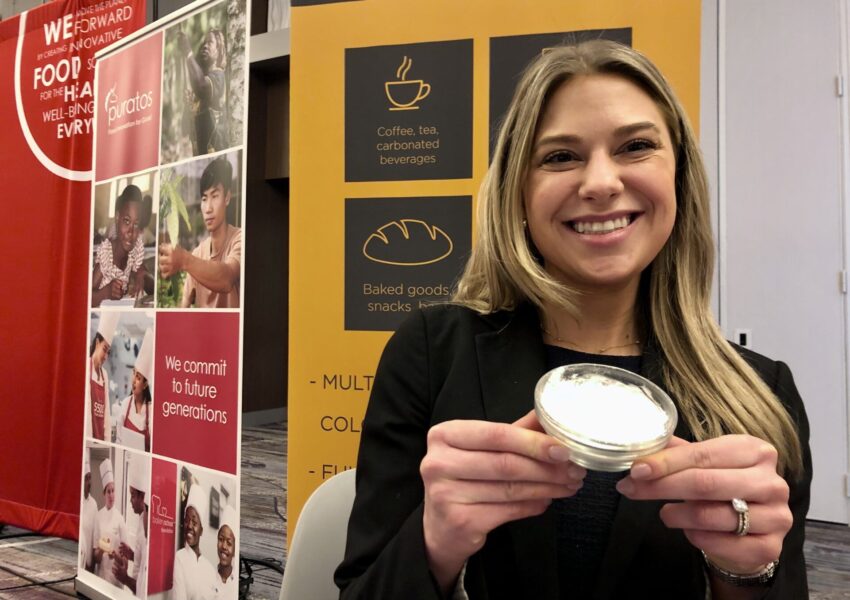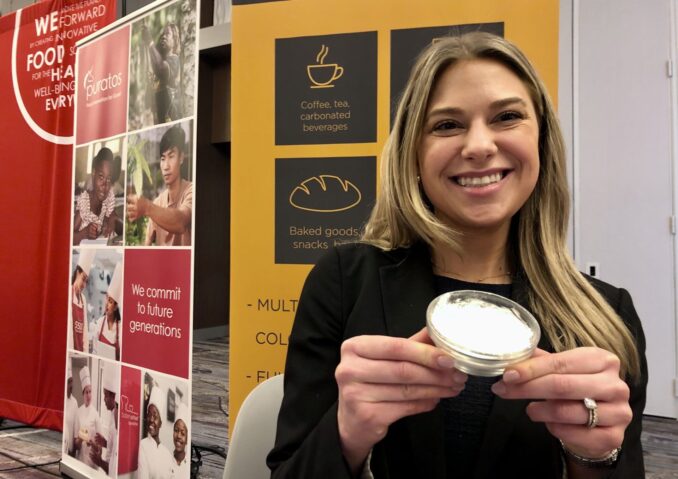In part two of our roundup of the Future Food-Tech summit in San Francisco, we highlight startups spanning a range of fields from molecular farming to upcycled prebiotic fibers from leftover parts of crops.
Comet gears up to open dedicated plant for production of prebiotic fiber arabinoxylan from wheat straw

Comet—a startup developing functional fibers and sweeteners from upcycled ingredients—is opening a manufacturing facility in Kalundborg, Denmark with RE Energy on April 28 where it will deploy patented water-based extraction technology allowing it to extract the prebiotic fiber arabinoxylan from wheat straw.
A fiber found in the cell walls of several plants, arabinoxylan has a range of benefits from prebiotic effects to blood glucose control and immune health support.
But no one has found a cost-effective way to isolate and produce it on an industrial scale… until now, says Comet, which claims it has distinct advantages in the prebiotic space given its high-tolerability and high-potency: “We’re seeing prebiotic effects with only 3g a day, so you can have very low inclusion rates.”
Forte Protein: Animal proteins in lettuce using expression vector technology
New York-based molecular farming startup Forte Protein uses a transient expression system that enables it to produce a range of animal proteins from lactoferrin to bovine serum albumin in plants such as lettuce.
“We take our gene encoding our protein, and I’ve made a vector that we can introduce to regular plant leaves that are not transgenic,” founder and CEO Dr. Kathleen Hefferon told AFN.
“It could be lettuce or some other crop, and then we leave in the greenhouse and in just two or three days we get a ton of our protein because our vector replicates all over the place so we can get a really high yield,” added Dr. Hefferon, who has a PhD in plant virology.
“It’s more efficient than precision fermentation [using genetically engineered microbes to produce the proteins in stainless steel fermentation tanks] and as we’re using a replicating vector system, we don’t have to make a transgenic plant… which means we’re able to move more quickly [from a regulatory perspective].
“We can introduce the vector via a vacuum system that sucks the vector into the plant cells or via a spray.”
Precision fermentation startup Eggmented Reality teams up with Israeli food giant Tnuva

Israeli startup Eggmented Reality uses bioinformatics to identify proteins that can deliver specific functionality such as gelling, binding, foaming or stretching, and then produces them in host microorganisms. Its first product is an egg and methylcellulose functional alternative.
“Many alternative protein companies are failing on taste, texture, functionality but also economics,” cofounder and CEO Jonathan Rathauser told AFN.
“Precision fermentation is expensive, so we are pursuing superior functionality so formulators can use less of an ingredient to achieve functional parity. We’re able to use 40-50% less of our protein to achieve the same gelation capability that commercial ovalbumin or egg white powder can deliver.”
Israeli food giant Tnuva, which has invested in Eggmented Reality via the Fresh Start foodtech incubator, has just announced a joint development agreement with the startup, said Tnuva’s chief innovation officer Shay Cohen.
“Eggmented represents the next generation of precision fermentation companies that really focuses on unit economics and functionality.”
Clean Crop Technologies tackles food waste with cold plasma
Clean Crop Technologies tackles food waste with cold plasma: “We target applications where we can achieve the same results as thermal pasteurization without harming quality,” founder and CEO Dan White told AFN.
Ergo Bioscience taps into plant cell culture for more complex animal proteins

Argentinian startup Ergo Bioscience uses plant cells as hosts for animal proteins such as casein, myoglobin and immunoglobulins, cofounder and CEO Alejandro Barbarini told AFN.
“Plant cells can produce more complex proteins than microbes, and carrot (cells) grow very fast in suspension in bioreactors. For simple proteins like whey or collagen, yeast or bacteria will be the most efficient hosts, but for something like bovine myoglobin, we have much better yields [than microbial hosts such as yeast].”
IngredientWerks: Animal proteins in corn

Spun off from biotech firm AgriVida last year, Massachusetts-based IngredientWerks is a molecular farming startup expressing animal proteins such as myoglobin and casein in genetically engineered corn, an approach it claims can be scaled at a fraction of the cost of precision fermentation.
While the regulatory pathway for approving new GM crops can be lengthy, acknowledged CEO Matt Plavan, the team at IngredientWerks already has experience of going through the US regulatory process to commercialize ingredients from genetically engineered corn when they worked at AgriVida, which brought three such products to market.
BioLumen takes novel approach to reducing the glycemic impact of processed foods
A fiber-based supplement that can reduce the absorption of sugars in foods could help lower the glycemic impact of processed foods and deliver digestive benefits, claims San Francisco-based startup BioLumen.
Kyomei: Animal proteins in leafy greens

We end our gallery with another new player in the emerging molecular farming space, UK-based Kyomei, which uses leafy greens as hosts to grow animal proteins such as myoglobin with high yields, claimed founder and CEO Meir Wachs.
“Leafy greens are edible hosts that strictly speaking don’t need processing. You could eat our hosts straight out of the ground, so downstream processing becomes a matter of utility rather than necessity.”





